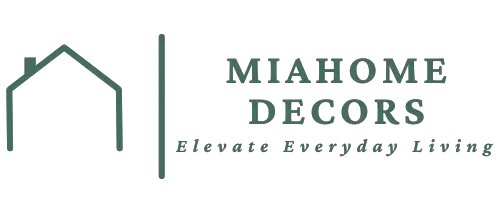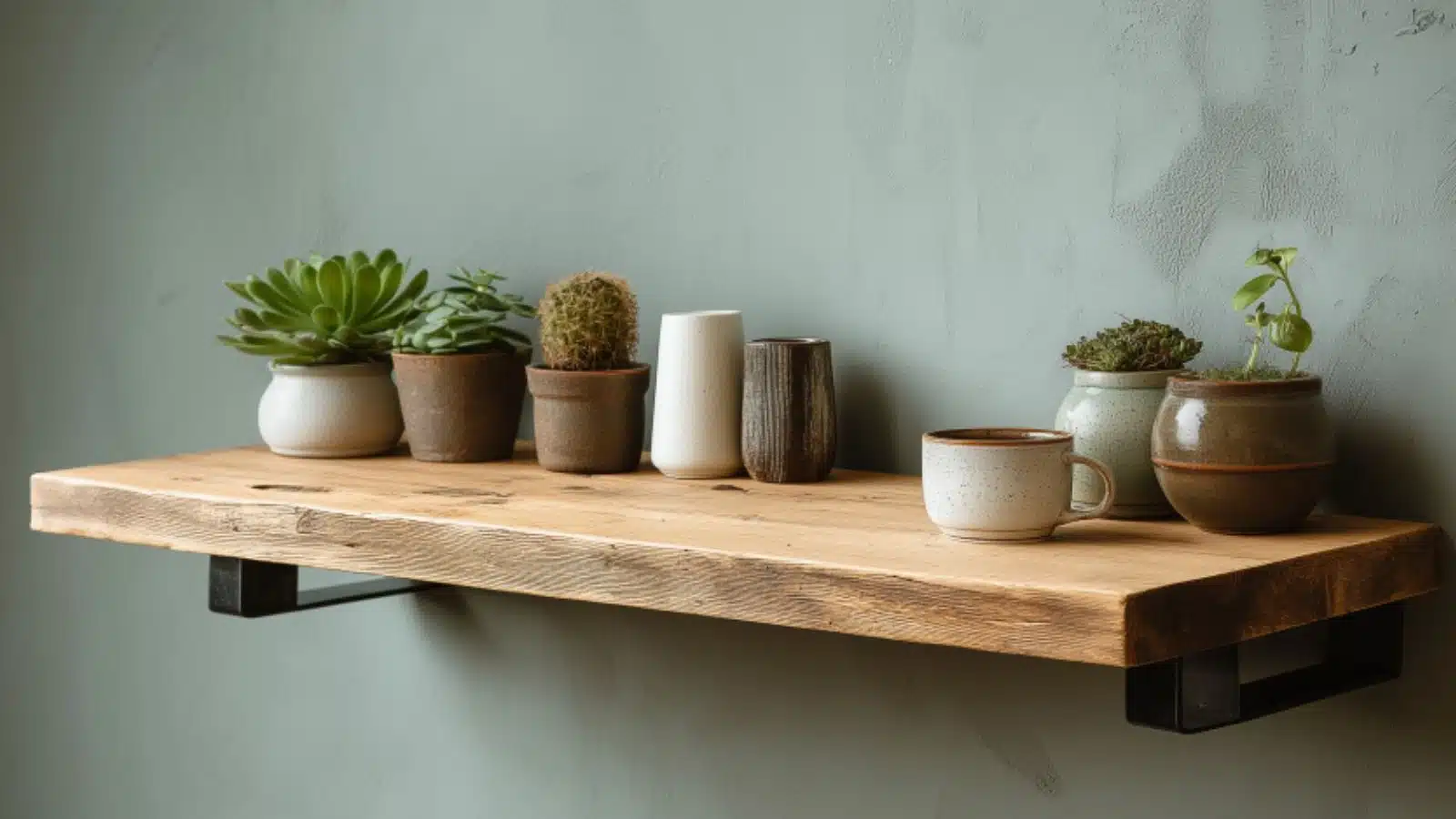Stylish DIY Floating Desk Inspiration for Modern Home Offices
Table of Contents
As more people embrace remote work and hybrid routines, home office design has become an essential part of creating a productive and inspiring environment. But in smaller spaces or multi-use rooms, traditional bulky desks often feel overwhelming. That’s where the DIY floating desk comes in—offering clean lines, a minimalist footprint, and endless customization possibilities.
Floating desks are wall-mounted work surfaces that appear to “float” without bulky legs or support beams beneath them. This not only frees up floor space but also gives the room an airy, modern feel. Whether you’re working with a tight nook in a bedroom or designing a full-scale office, a floating desk can be tailored to suit your needs, style, and storage preferences.
In this post, we’ll explore DIY floating desk inspiration for every type of home office. From material options and layout planning to built-in storage and lighting, each section provides practical tips and elegant design ideas. If you’re looking to upgrade your workspace with something sleek, functional, and budget-friendly, these ideas will help you get started—beautifully.
Benefits of Choosing a Floating Desk for Your Home Office
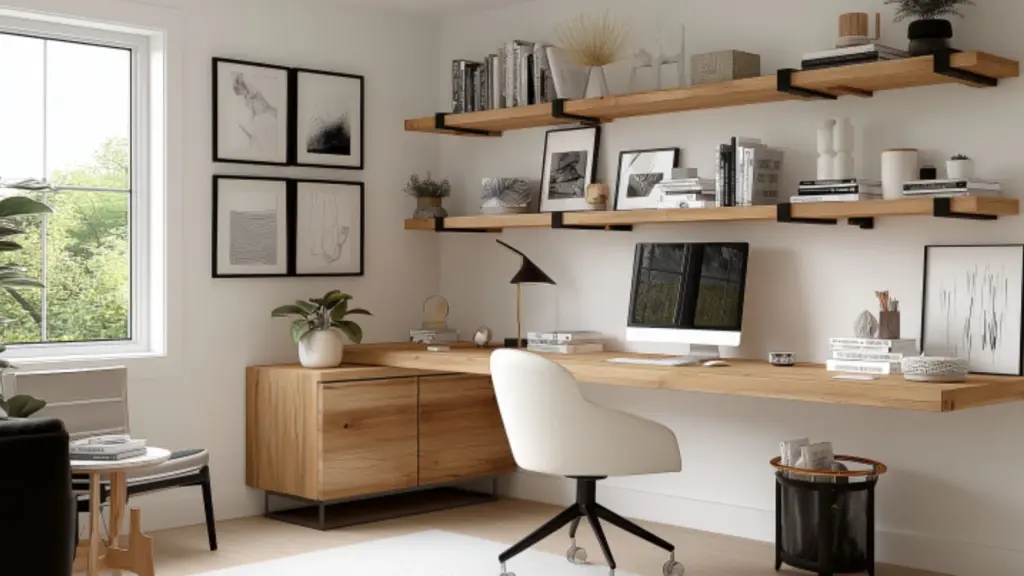
Floating desks aren’t just stylish—they’re incredibly practical. Their wall-mounted design makes them ideal for optimizing floor space, which is especially valuable in apartments, studio spaces, and multifunctional rooms. Whether used for a dedicated office, homework zone, or crafting station, the floating desk offers sleek, streamlined functionality.
One of the biggest advantages is customization. You can mount the desk at any height, adjust the width to fit your wall space, and choose materials that match your decor—wood, plywood, laminate, or reclaimed boards all work beautifully. Plus, installation can be surprisingly simple, often requiring only brackets and a level.
From a design standpoint, floating desks give you the freedom to style the space around them. Pair them with floating shelves, pegboards, or statement lighting to complete the look without overcrowding the area.
Why a Floating Desk Works for Home Offices
| Benefit | Description | Ideal For |
|---|---|---|
| Space-Saving Design | Frees up floor space for legroom or storage | Small rooms or studio apartments |
| Modern Aesthetic | Clean lines with minimal visual clutter | Scandinavian or contemporary styles |
| Height Customization | Mount desk at ergonomic height | Shared workstations or kids’ zones |
| Easy to DIY | Simple construction with wall brackets | Weekend project for beginners |
Choosing the Right Materials for Your DIY Floating Desk
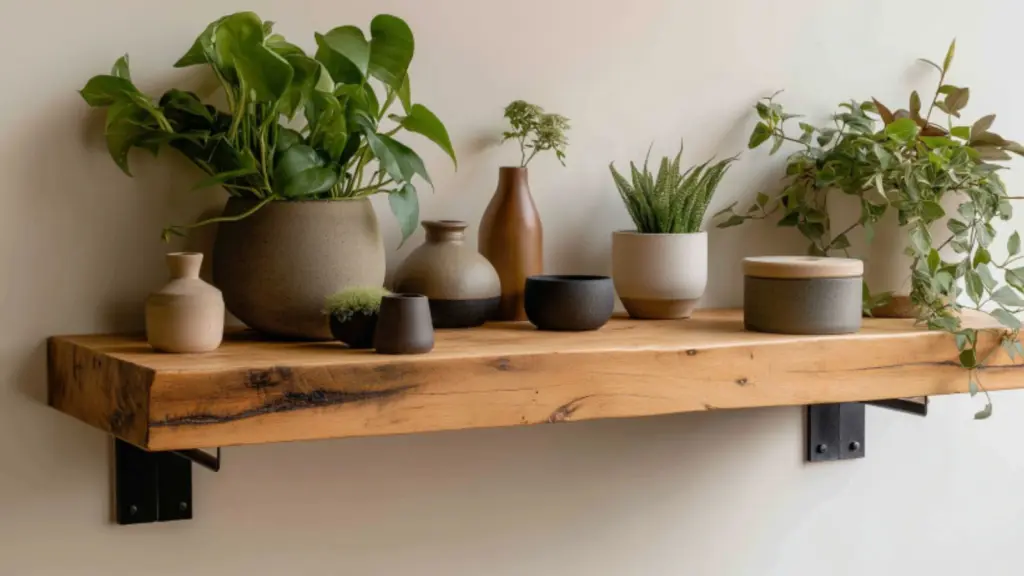
The beauty of a floating desk lies in its flexibility—and that includes the materials you use. Your choice affects not only the look of the desk but also its durability, ease of installation, and overall budget.
Solid Wood and Butcher Block
Ideal for a warm, natural look. These materials offer durability and timeless appeal. Butcher block in oak, maple, or walnut adds an upscale feel, while pine or birch offers a more affordable yet rustic finish.
Plywood with Edge Banding
A budget-friendly favorite among DIYers, plywood can be cut to any size and finished with veneer or edge banding to give it a polished look. Great for modern or Scandinavian spaces.
Reclaimed Wood
For those seeking texture and character, reclaimed boards are perfect. Whether sourced from old furniture, barn wood, or salvaged flooring, this option adds depth and sustainability to your project.
Laminate or Melamine Boards
These are low-maintenance and available in a variety of finishes—from matte black to marble-look white. Ideal for workspaces that require frequent cleaning or that lean modern-industrial.
Material Comparison Table
| Material Type | Look & Feel | Cost | Durability | Style Compatibility |
|---|---|---|---|---|
| Solid Wood | Warm, classic | $$$ | High | Traditional, modern farmhouse |
| Plywood | Clean, modern | $–$$ | Moderate | Scandinavian, minimalist |
| Reclaimed Wood | Rustic, unique | $$–$$$ | Variable | Boho, cottagecore, vintage |
| Laminate Boards | Sleek, low-maintenance | $–$$ | High | Contemporary, industrial |
Choose your material based on how you’ll use the desk, the tools you have, and the overall aesthetic you want to achieve.
Incorporate Built-In Storage Without Losing Minimalism
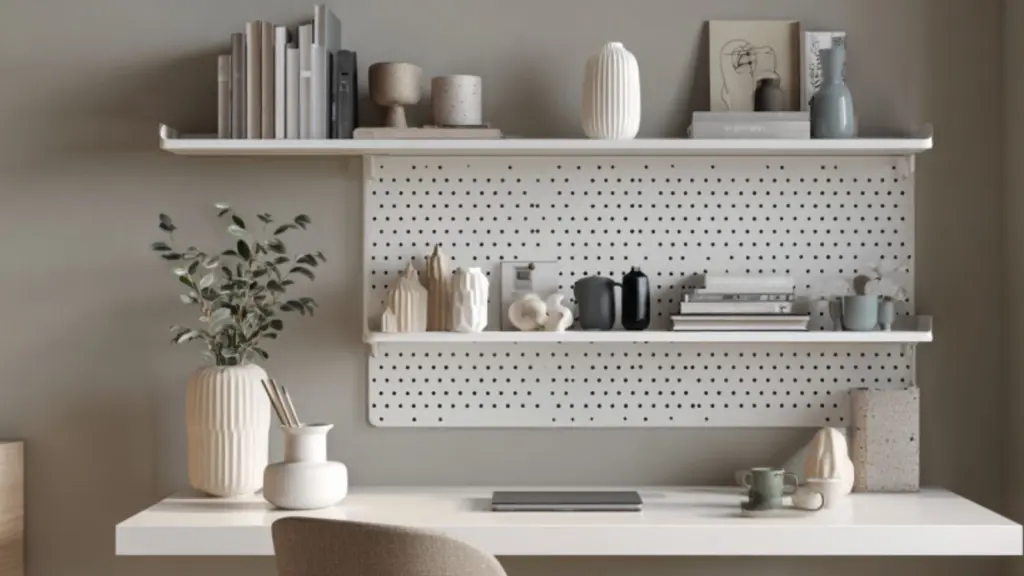
One challenge with floating desks is managing clutter, especially when you don’t have drawers. But clever built-in storage can keep everything organized while preserving that clean, minimalist appeal.
Hidden Drawers or Slide-Out Trays
Install shallow drawers underneath the desk surface to hold notebooks, chargers, and office essentials. Soft-close hardware keeps the design sleek and quiet.
Floating Shelves Above or Beside
Pair your desk with wall-mounted shelves for books, storage baskets, or decorative items. Choose wood tones that match the desk for a cohesive look.
Pegboards or Magnetic Panels
Mount a pegboard above the desk to hang small bins, supplies, or inspiration photos. It’s a stylish way to keep the desktop clear.
Built-In Storage Ideas for Floating Desks
| Storage Feature | Function | Design Tip |
|---|---|---|
| Undermount Drawer | Keeps items out of sight | Match material to desktop finish |
| Wall Shelves | Adds vertical storage space | Stagger shelf heights for interest |
| Pegboard Organizer | Flexible, modular tool and decor wall | Paint to match or contrast |
| Cable Tray or Grommet | Tames cords and chargers | Choose black or brass accents |
Design Around Your Space: Desk Ideas for Small or Large Offices
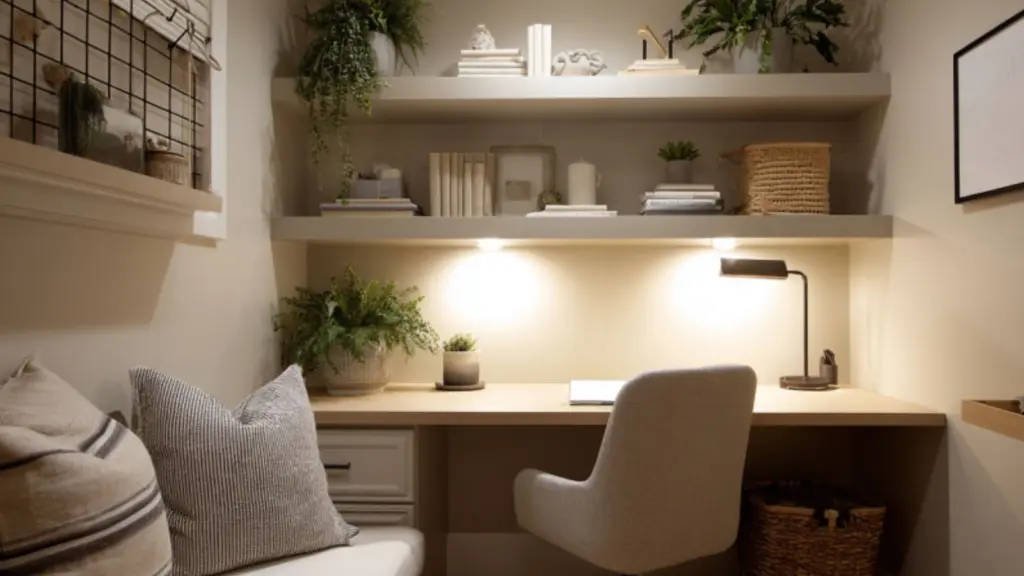
No matter the size of your home office, a floating desk can be tailored to fit. The key is to think creatively about wall space, lighting, and how the desk integrates with the room.
Corner Desks
Perfect for awkward spaces or rooms with large windows. Mount two boards in an L-shape for a roomy workspace that feels tucked away.
Window Desks
Floating desks beneath a window bring in natural light and create a sense of openness. Ideal for writers or creatives seeking inspiration.
Narrow Wall Desks
If you’re working with a hallway, closet, or nook, a slim board mounted along the wall makes for a practical, space-saving setup.
Full-Length Desks
For shared workspaces or larger offices, install a long floating desk with multiple brackets. This allows for two workstations or additional storage zones.
Desk Layout Options by Room Size
| Layout Type | Best For | Bonus Tip |
|---|---|---|
| Corner Desk | Studio or multipurpose rooms | Add LED strip lighting underneath |
| Under-Window Desk | Light-filled spaces | Use sheer curtains for softness |
| Narrow Desk | Small bedrooms or hallways | Pair with a slim stool or ottoman |
| Wide Wall Desk | Large offices or shared rooms | Include two task chairs for versatility |
Pair Your Floating Desk with the Right Seating and Lighting
A floating desk’s function and comfort are defined by more than the wood you choose. The chair you pair it with and the lighting that supports it are equally crucial to its success as a workspace.
Choosing a Chair
Since floating desks often lack depth underneath, your chair should be compact but ergonomic. Look for armless chairs with a slim profile. Consider natural materials like rattan, wood, or boucle upholstery to match a minimalist or boho aesthetic.
Task vs. Accent Chairs
If your floating desk is used daily, prioritize an adjustable task chair for support. If it’s more of a decorative or light-use desk, an upholstered side chair or vintage stool works beautifully.
Lighting Considerations
Task lighting is essential, especially if your desk isn’t near a window. Sconce lighting mounted to the wall saves space and adds a chic touch. Alternatively, a small table lamp in ceramic, marble, or brass adds visual interest and warmth.
Seating & Lighting Options for Floating Desks
| Component | Ideal Style Pairing | Tip for Function and Comfort |
|---|---|---|
| Slim Task Chair | Mid-century or modern desk | Look for adjustable seat height |
| Woven Accent Chair | Natural wood or coastal desks | Add a soft cushion for support |
| Wall Sconce Light | Minimal or contemporary spaces | Use warm white bulbs for mood |
| Table Lamp | Cottagecore or rustic styles | Choose with integrated USB port |
Customize with Style: Decor Touches That Define the Space
While functionality is key, don’t underestimate the impact of well-chosen decor. A few thoughtful additions can help your floating desk blend seamlessly into your room while making the space feel distinctly your own.
Wall Art and Mood Boards
Hang a framed print, minimalist artwork, or a rotating corkboard of inspiration. Keep scale proportional to the desk to maintain balance.
Greenery and Natural Elements
A small potted plant, glass terrarium, or trailing pothos on a nearby shelf brings life and freshness to the workspace.
Storage Accents
Use decorative trays, ceramic bowls, or wooden boxes to corral everyday items. Matching your storage accessories to your decor palette helps unify the space.
Floating Desk Decor Checklist
| Decor Element | Purpose | Design Tip |
|---|---|---|
| Framed Artwork | Adds personality | Align with desk edge for cohesion |
| Small Plant or Vase | Brings color and organic shape | Choose sculptural or vintage styles |
| Desktop Tray | Holds pens, keys, or notes | Opt for marble, rattan, or leather |
| Stylish Clock | Adds functionality and charm | Look for minimal or retro design |
Conclusion
A DIY floating desk is more than a weekend project—it’s a creative solution that turns any corner of your home into a polished, productive retreat. Whether you’re designing for compact efficiency or elegant simplicity, floating desks offer a balance of form and function that traditional furniture often can’t match.
With the right materials, thoughtful layout, and a touch of personal style, your workspace can feel as beautiful as it is functional. From cozy reading nooks to sleek offices, floating desks adapt to your space and elevate your everyday routine.
